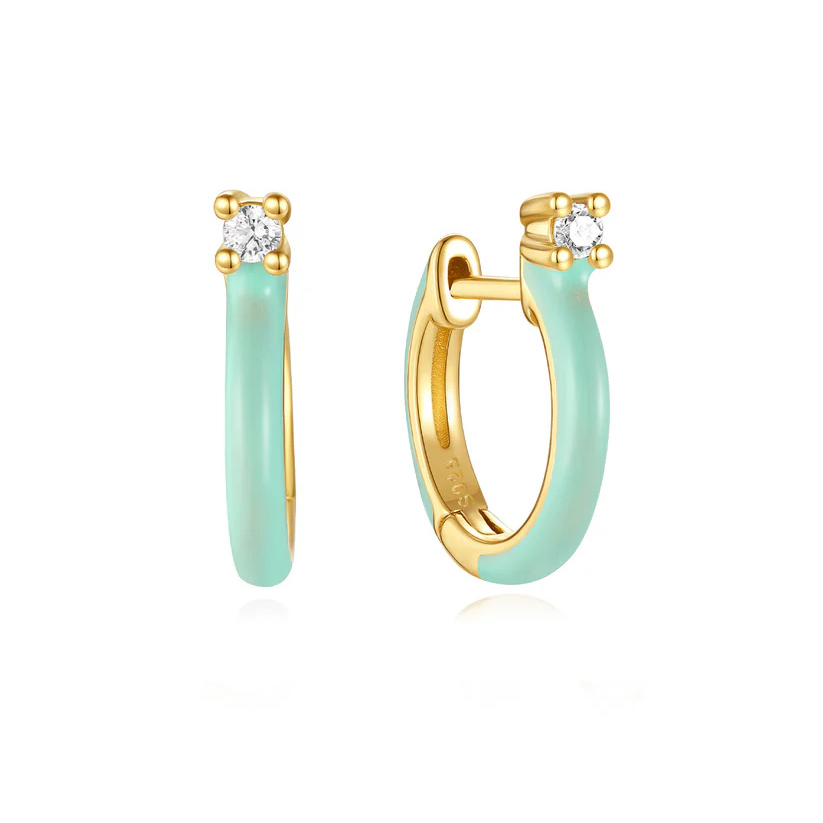The Cost of Gold-Plated and Enamel (Drip Oil) Earrings: A Comprehensive Pricing Guide
Introduction
Combining gold plating with enamel drip oil techniques creates stunning, colorful earrings that blend luxury with artistic craftsmanship. However, pricing these pieces can be complex due to multiple factors like material quality, labor, design intricacy, and production scale.
This 5,000-word guide breaks down the true cost structure of gold-plated enamel earrings, helping buyers, designers, and jewelry enthusiasts understand pricing from raw materials to retail markup.
1. Understanding Gold-Plated Enamel Earrings
1.1 What Are Gold-Plated Earrings?
- Base metal (usually brass, copper, or sterling silver) coated with a thin layer of gold via electroplating.
- Common gold plating thicknesses:
- 0.5 microns (light plating, wears off in months)
- 1-3 microns (standard for jewelry, lasts 1-2 years)
- 5+ microns (“heavy gold plating,” more durable)
1.2 What Is Enamel (Drip Oil) Work?
- Enamel is powdered glass fused onto metal at high heat, creating vibrant colors.
- Drip oil enamel (a Chinese technique) involves hand-painting resin-based colors for a glossy, liquid-like effect.
- Types of enamel finishes:
- Opaque (solid colors)
- Transparent (see-through, layered effect)
- Textured (raised 3D patterns)
1.3 Why Combine Gold Plating + Enamel?
- Aesthetic contrast (luxe gold + bold colors)
- Durability (gold resists tarnish, enamel protects underlying metal)
- Affordable luxury (cheaper than solid gold but high-end looking)
2. Cost Breakdown: Materials, Labor & Markup
2.1 Base Metal Costs
| Metal Type | Price per Gram (USD) | Pros & Cons |
|---|---|---|
| Brass |
0.10−0.30 |
Cheap, easy to plate, durable |
| Copper |
0.08−0.20 |
Soft, may oxidize under enamel |
| 925 Silver |
0.80−1.50 |
Premium, hypoallergenic, best for high-end designs |
Estimated Cost per Pair (Base Metal): 1−10
2.2 Gold Plating Costs
| Plating Thickness | Cost per Pair (USD) | Durability |
|---|---|---|
| 0.5 micron |
0.50−2 |
Lasts ~6 months |
| 1-2 microns |
3−8 |
Lasts 1-2 years |
| 3-5 microns |
10−20 |
Lasts 3-5 years |
Note: 24K gold plating is more expensive than 14K/18K.
2.3 Enamel (Drip Oil) Application Costs
| Enamel Type | Cost per Pair (USD) | Labor Time |
|---|---|---|
| Machine-applied (industrial) |
2−5 |
Fast, limited colors |
| Hand-painted (drip oil technique) |
15−50+ |
1-3 hours per pair |
| High-fire cloisonné (luxury) |
50−200+ |
5+ hours per pair |
Key Factors Affecting Enamel Cost:
- Color complexity (gradients cost more)
- Number of layers (more = higher price)
- Artisan skill level (experienced enamelists charge
30−100/hour)
2.4 Additional Costs
| Component | Price Range (USD) |
|---|---|
| Earring hooks/clasps |
0.50−5 (sterling silver/gold-plated) |
| Gemstone accents |
5−100+ (cubic zirconia vs. sapphires) |
| Packaging |
1−10 (basic vs. luxury box) |
3. Total Cost Estimates (Per Pair)
| Quality Tier | Base Cost | Retail Price (3-5x markup) |
|---|---|---|
| Budget (thin plating, machine enamel) |
5−15 |
15−50 |
| Mid-range (2µm gold, hand-drip enamel) |
20−60 |
60−200 |
| Luxury (thick plating, artisan enamel) |
80−300+ |
250−1,000+ |
Example:
- A pair of gold-plated brass earrings with hand-painted drip oil enamel (2µm gold, no gems) costs
25−50 to produce
and sells for
75−250
.
4. How to Reduce Costs Without Sacrificing Quality
- Use brass instead of silver (90% cost savings on base metal).
- Order in bulk (discounts on plating and enamel work).
- Simplify designs (fewer enamel colors = less labor).
- Use synthetic gems (cubic zirconia instead of diamonds).
5. Conclusion: Is It Worth the Price?
Gold-plated enamel earrings offer luxury aesthetics at a fraction of solid gold prices. While handmade drip oil designs are labor-intensive, they justify higher retail costs with unique artistry. Buyers should prioritize:
- Gold plating thickness (1-3µm for longevity)
- Enamel quality (hand-painted > machine-made)
- Metal base (sterling silver for hypoallergenic wear)
